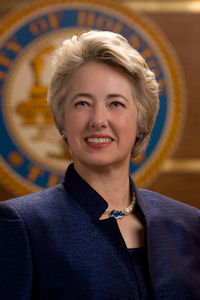After making a rousing speech at the TDP convention, Mayor Annise Parker talked about some possible paths she could take for a future statewide campaign.
Parker said she would be interested in running for any number of statewide positions when her third and final two-year term is up in 2016 – even Texas’ top job.
“I would absolutely consider a statewide ballot effort for the right seat,” Parker told the Houston Chronicle, adding that she doesn’t have an exact plan drawn up at this time. “And as the CEO of the 4th largest city in America, I could be the governor of Texas.”.
The 58-year-old said she would be “eminently qualified” to be comptroller of public accounts, Texas land commissioner or sit on the three-member Texas Railroad Commission.
The only jobs for which she isn’t interested? Lieutenant governor and U.S. Congress. “Respectfully to members of Congress, I’m the CEO of a $5 billion corporation, and I make decisions every day. I don’t want to go talk about things. I want to do things.”
I’ve discussed this before, and I’m mostly not surprised by Parker’s words. The one office I hadn’t foreseen as a possibility was Land Commissioner, but between veterans’ issues and the leases that the GLO manages and grants on occasionally urban land, it makes sense. And of course the Railroad Commission is all about oil and gas regulation, and Mayor Parker spent 20 years in the oil business before entering politics. Other than the RRC, which has six-year terms for its three Commissioners, the candidacy of Mayor Parker or anyone else for these offices is contingent on them not being won by a Democrat this year. As awesome as that would be, it would throw a wrench into the works for the large number of potential up-and-comers now waiting in the wings.
For her part, Parker is watching the political trajectories of two other Houston women: state Sen. Sylvia Garcia and state Rep. Carol Alvarado. A fellow former mayor who now sits in the state Senate, Kirk Watson, is also on her list of rising stars, as are Mayor Julian Castro and U.S. Rep. Joaquin Castro.
The twin brothers from San Antonio are widely accepted to become the default face of the party after this year’s statewide election. Speaking to the Chronicle after his speech in a packed convention hall Friday evening, the congressman would not preview where his political trajectory might lie.
“I’ll look at all opportunities where I can be most helpful,” said Joaquin Castro. He added he hasn’t yet decided whether he might run for another office, such as U.S. Senate. Some see him as a natural foil to Ted Cruz, R-Texas.
His brother, tapped by President Barack Obama to be the next housing secretary, is also considered one of the most viable statewide or national candidates from the party, although some worry whether his political standing will suffer at the hands of Republicans in Washington as so many other cabinet secretaries have in recent years.
Representing Texas in Washington, U.S. Reps. Marc Veasey and Pete Gallego repeatedly made the “best of” lists of many state party leaders this weekend.
In Dallas, state Rep. Rafael Anchia and Sen. Royce West are ones to watch, they said, while Sylvester Turner is another prominent Houstonian with political potential.
I’ve discussed the bench and the possible next step for a variety of Dems before. One person who isn’t mentioned in this story but should be is State Rep. Mike Villarreal of San Antonio, who has been previously mentioned as a candidate for Comptroller and who has announced his intent to run for Mayor of San Antonio in 2015. Winning that would move him up a notch on the “rising stars” list as he’d be a Mayor with legislative experience; you can add Rep. Sylvester Turner to that list if his third try for Mayor of Houston is the charm in 2015, too.
Besides the RRC, there is one prize that will remain on the board for 2018 regardless of what happens this year.
“It’s very different to run for statewide office unless you have statewide name recognition,” said [TCU poli sci prof James] Riddlesperger, who said the sheer amount of money statewide candidates in Texas are forced to raise to be viable pushes some out of the race before they can get started.
“It’s not like doing it in New Hampshire or South Dakota. We have six or seven major media markets and it’s enormously expensive to get statewide recognition,” said Riddlesperger. Keeping this in mind, he said the Democrats should keep a close eye on who could unseat Cruz in 2018.
“I suspect there would be a huge amount of national money that could potentially flow into that election,” he said.
Indeed. I mean, the amount spent in the 2018 re-election campaign for Ted Cruz on all sides will likely rival the GDP of several small nations. The story suggests US Rep. Joaquin Castro as the very-early-to-be-leading choice to take on Cruz, but I suspect we will hear a lot of other voices before all is said and done, whether or not there are fewer incumbent Republicans to oppose at that time. I don’t want to spend too much time thinking about this since we have some pretty damn important elections to focus on this year, but file that all away for future consideration.

